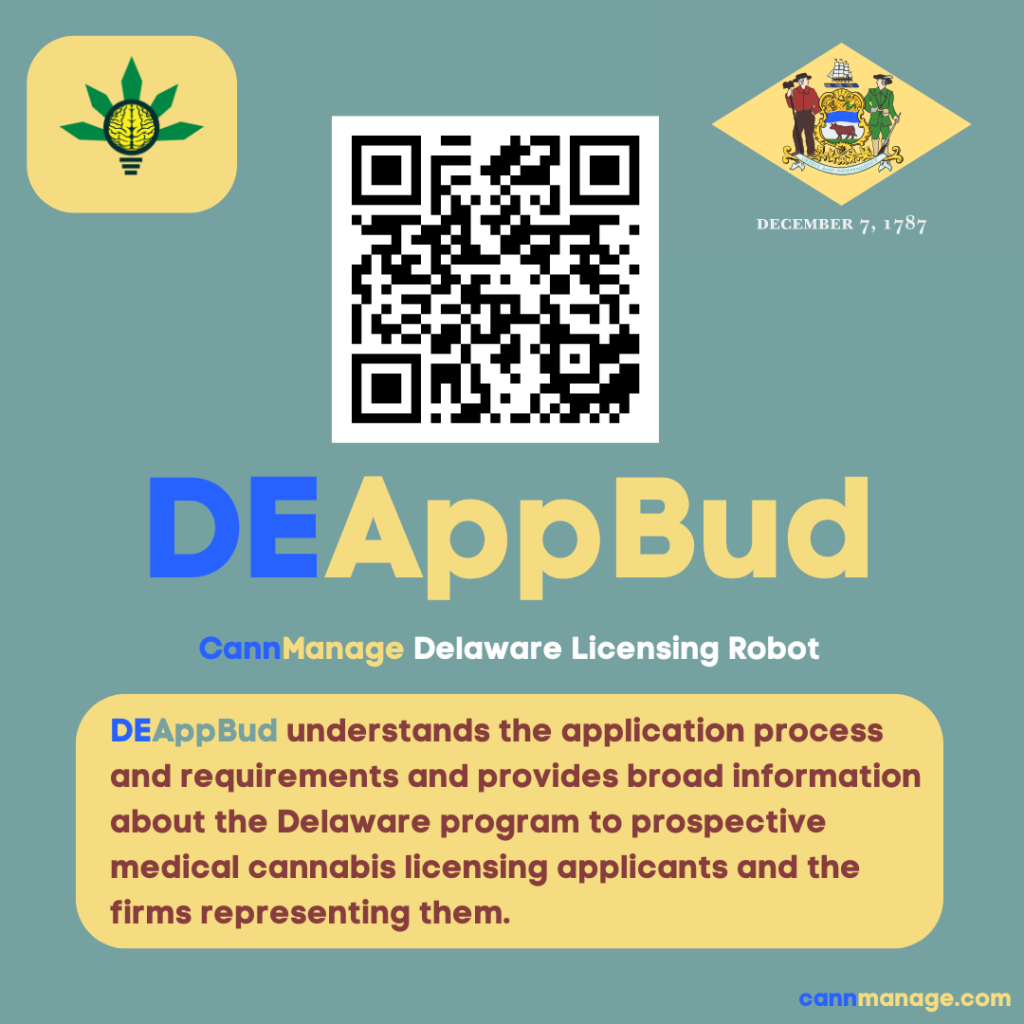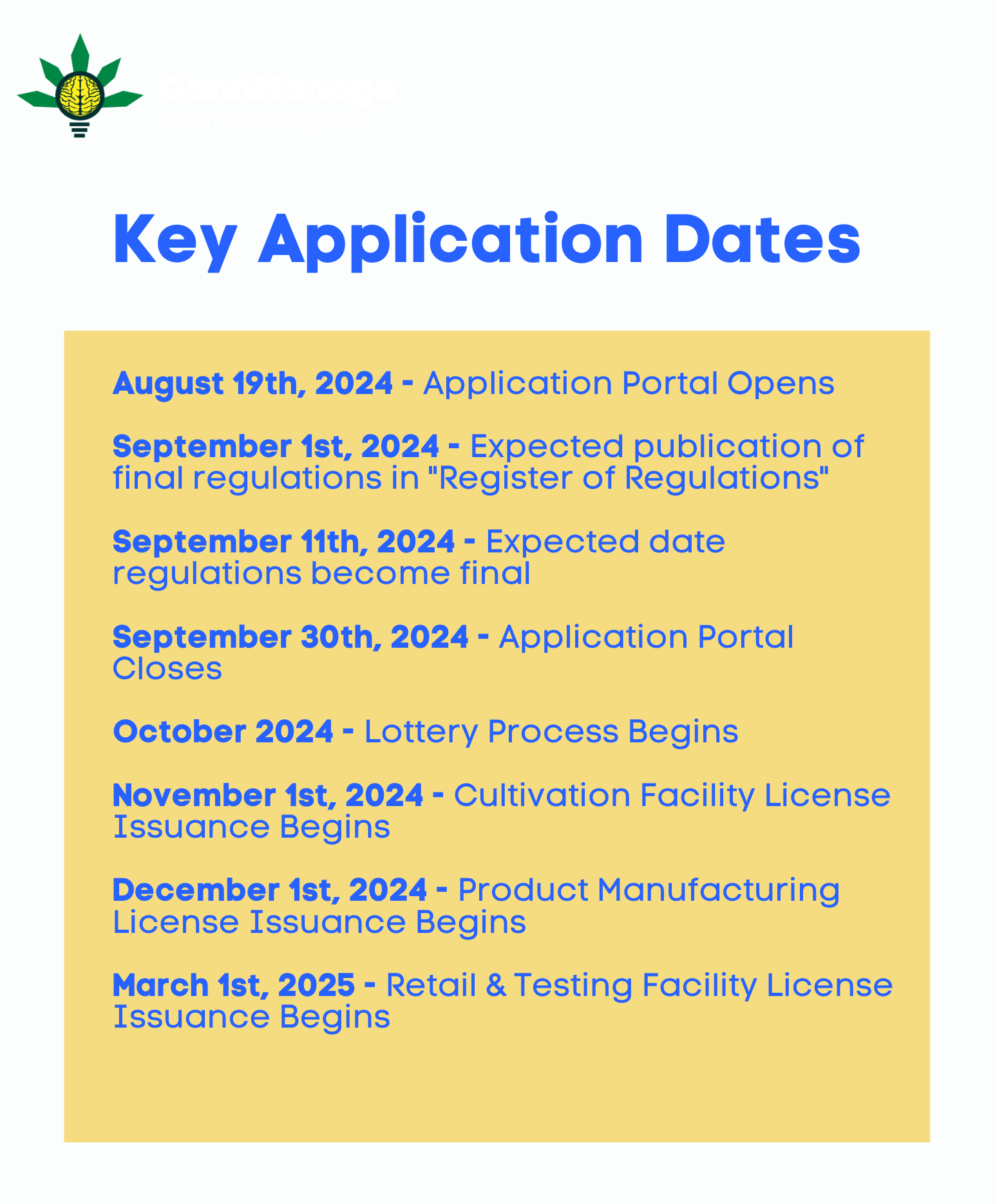CannManage Delaware Cannabis Licensing Application Guide
Myers, B., Buckley, T. J., & Abdulwaliy Oyekunle. (2024). CannManage Delaware Application Guide.
Are you looking to apply for a dispensary, grow, concentrate, infused product, or testing facility in Delaware? Did you know that you do not have to be a Delaware resident (note: unless you are applying for a microbusiness), and real estate is not required to submit your application? CannManage has developed the ultimate guide to cannabis licensing in Delaware. Schedule a free consultation here to receive our free Delaware Application Guide. Enjoying this technical writing content? Please hyperlink back to this article if you use this information. We are affordable, experienced technical writers who can assist in writing, submitting, and maintaining all of your cannabis licenses.
What if I told you that you don’t have to read any of this?

Our DEAppBud by CannManage is a virtual helper preloaded with all the necessary information to help you navigate the licensing process. We’ll update this GPT and this blog post throughout the application process.
The OMC is now accepting applications starting on August 19th, 2024. The process is detailed and requires careful preparation to ensure success. The OMC has updated its website and has provided both the document matrix and application forms on the OMC’s website.
By outsourcing your application writing, preparation, and finalization needs to CannManage, you can focus on other critical aspects while we ensure your application is thorough, accurate, and compelling. Do you need help with your Deleware cannabis business license? Here are some details on how to apply for a business and navigate the complex licensing system.

Delaware Application Robot
Delaware State History
As with most cannabis markets, Delaware first began with medical cannabis after the Delaware General Assembly passed Senate Bill 17, and Governor Jack Markell signed the Delaware Medical Marijuana Act on May 13, 2011. The Act became effective on July 1, 2011. The Division of Public Health (DPH) would be established and responsible for implementing the act. With the addition of Senate Bill 24 in 2017, the state added qualifying medical conditions that caregivers could prescribe medical marijuana while removing the requirement of approval from a psychiatrist and also legalizing cannabis oil for pediatric patients. Those who qualified were permitted to purchase medical marijuana from compassion centers by individuals with a valid medical marijuana card.
The State of Delaware Medical Marijuana Code permits medical care providers to prescribe cannabis for pain relief. These conditions include cancer, HIV/AIDS, and post-traumatic stress disorder. In 2022 and 2023, it was reported that debilitating pain, muscle spasms, and PTSD were the common medical conditions for treatment.
Legislative Timeline of Adult-use Marijuana
The next set of legislation centered on the expungement of criminal records for recreational marijuana. Before 2011, adult use of marijuana was common, with 22.7% of federal drug-related criminal charges in Delaware being marijuana-based. The shift in paradigm to legalize medical marijuana in 2011 paved the way to relax adult-use marijuana laws, and in 2015, Governor Jack Markell signed House Bill 39. This Bill serves to decriminalize the possession of small amounts of marijuana. Offenders wouldn’t be criminally charged if they possessed less than one ounce of marijuana; instead, it was a civil offense where an offender would pay a $100 fine without spending time in jail.
In 2018, Senate Bill 197 was signed to expand the expungement laws. SB 197 was enacted to allow first-time offenders who possessed up to an ounce of cannabis to clear their records. In 2019, Senate Bill 45 was passed, and the law expanded decriminalization to include individuals under 21. Although cannabis is now legal for adults 21 and older in Delaware, underage individuals found with cannabis still face a civil penalty.
Other expungement Bills are Senate Bills 111 and 112, both passed in 2021. These bills define all misdemeanor cannabis convictions for outright expungement.
Fully Legalizing Recreational Marijuana
Following the trend in other states, Delaware moved to decriminalize marijuana for recreational use after a decade of experience with the legal medical market, becoming the 22nd State to legalize recreational marijuana. In April 2023, House Bill 1 (HB1) and House Bill 2 (HB2) were passed by the General Assembly without the signature of John Carney. The HB1 Act serves to “remove all penal penalties for use or possession of a personal use quantity of marijuana and marijuana accessories for those of age 21 years or older.” HB2 enacts regulations for cannabis business for production, sale, and taxation. HB2 also includes the guidelines for cannabis business licenses for different facilities, such as retail stores, cultivation facilities, and testing facilities.
While HB1 decriminalizes the personal use of marijuana, the legal quantity that an individual can possess is regulated. Personal use quantity is defined as one ounce or less. The transportation of this quantity is permitted in an enclosed container. Public consumption of recreational marijuana is outlawed.
Delaware Hemp program
The evolution of marijuana laws in Delaware has successfully yielded the full legalization of the plant for medical and recreational purposes. Apart from attempts to legalize marijuana, over the years, Delaware has expanded its legislative laws on cannabis to enable the use of hemp for agricultural and academic research purposes. After the passage of Senate Bill 266 in August 2018, hemp is legal for production.
The 2018 Farm Bill fully legalized hemp and its derivatives. Delaware took advantage of the Federal Law that permits hemp for agricultural and research purposes to expand its hemp policies and regulations beyond academic research and agriculture. The state only allows hemp-derived products with no more than 0.3% THC. Hemp consumers with licenses from the United States Department of Agriculture(USDA) can only cultivate or process hemp into foods and edibles. Delaware provides regulatory responsibility for hemp production due to approval from the USDA in 2020. This approval enables the state to initiate a robust plan for domestic hemp production. When the USDA approved the final policies, the number of hemp producers in Delaware grew from 14 in 2021 to 33 in 2023.

Delaware Cannabis Legislative History
2011 – On May 13, Senate Bill 17 was passed by the Delaware General Assembly and signed by Governor Jack Markell, creating the Delaware Medical Marijuana Act. The Act became effective on July 1, 2011, with the Division of Public Health (DPH) established for implementation.
2015 – House Bill 39, signed by Governor Jack Markell, decriminalized the possession of small amounts of marijuana (less than one ounce), making it a civil offense with a $100 fine instead of a criminal charge.
2017 – Senate Bill 24 was passed, adding qualifying medical conditions for medical marijuana, removing the requirement for psychiatrist approval, and legalizing cannabis oil for pediatric patients.
2018 – Senate Bill 197 was signed, expanding expungement laws to allow first-time offenders possessing up to an ounce of cannabis to clear their records.
2019 – Senate Bill 45 was passed, expanding decriminalization to include individuals under 21.
2021 – Senate Bills 111 and 112 were passed, defining all misdemeanor cannabis convictions for outright expungement.
2023 – In April, House Bill 1 (HB1) and House Bill 2 (HB2) were passed by the General Assembly, fully legalizing recreational marijuana. HB1 removed all penal penalties for the use or possession of a personal use quantity of marijuana (one ounce or less) for those aged 21 years or older. HB2 enacted regulations for cannabis businesses, including production, sale, taxation, and guidelines for business licenses for various facilities (retail stores, cultivation facilities, and testing facilities). Public consumption of recreational marijuana was outlawed.
Licensing Fees
Application fees were established during the approval of the Marijuana Control Act. For all open applications, there is a non-refundable application fee of $5000, microbusiness applications have a fee of $3000, and social equity applications have a non-refundable fee of $1000. Cultivation fees will depend on the canopy size, ranging from $2500-10,000 biennially, and product manufacturing license fees are $10,000 biennially. Social equity applicants will receive a 40% discount on fees.

Market Quick Facts

We CannManage Your Delaware Application
Medical or Adult-Use Market: While Delaware does have an established medical cannabis market, after the official passage of HB1 and HB2, the state is now open to the adult-use recreational market.
Seed-to-Sale Tracking System Used: The official seed-to-sale tracking system for adult-use cannabis has not been established. However, Delaware has used NCS Analytics for its medical cannabis market.
Approved Products for Sale: Adult-use customers will have access to cannabis flower, vapes, edibles, tinctures, capsules, and other concentrates.
Age Verification System: Under 6.5.3.6, age verification will include verifying customer age by reviewing the purchaser’s government-issued photo identification card showing that the individual is 21 years of age or older or holds a valid medical marijuana program card. A valid, government-issued identification must contain a photo and the date of birth of the individual and be unexpired. Valid forms of government-issued identification include A driver’s license issued by any state within the United States, District of Columbia, or U.S. territory; An identification card, including a temporary identification card, issued by any state within the United States, District of Columbia, or U.S. territory; A United States military identification card or any other identification card issued by the United States government including a permanent resident card, alien registration card, or consular card; A passport or passport identification card; or A tribal enrollment card issued by the governing authority of a federally recognized Indian tribe.
Dispensary Sales Limits – Universal: An individual 21 years of age or older may possess up to the “personal use quantity,” which is defined as 1 ounce or less of marijuana in the form of leaf marijuana, up to 12 grams of concentrated cannabis, or cannabis products containing 750 milligrams or less of delta-9-tetrahydrocannabinol (as defined in HB1).
Deliveries: Under 6.5.2.9, deliveries are strictly limited to medical patients, and recreational deliveries are prohibited. Delivering retail marijuana or retail marijuana products to a person not physically present in the retail marijuana store’s licensed premises. Individuals holding a valid medical marijuana program card may receive home delivery.
Online Ordering: Under 6.5.2.8, online pre-orders are permitted but the final transaction does not take effect until the customer is in the store. “Selling retail marijuana or retail marijuana products over the Internet. This does not preclude online pre-orders for pick-up at the retail location, provided that the sale is not completed until all other requirements have been met, including identity and age verification;”
State Nomenclature: Per Section 2.0 Definitions, Delaware exclusively utilizes the term “marijuana” for flower and final products.
Home Cultivation: Home cultivation is currently prohibited for medical and recreational use and is restricted only to licensed cultivation centers.
Detailed Guide to the Delaware Cannabis License Application Process
Understanding the intricacies of the application process is necessary due diligence for prospective cannabis entrepreneurs looking to establish operations in Delaware. This section will detail the specific requirements and documents needed to successfully apply for a cannabis license in Delaware, focusing on each required attachment and narrative component. The information here is derived directly from the Delaware Application Matrix and accompanying worksheets provided by the state.
The most definitive guide on the Delaware cannabis licensing process is the OMC’s website and official 16 page step-by-step application guide, which can be found HERE.
All documents will be completed using PDF forms. First, an applicant must obtain all required information, then complete the documents and complete and submit the license application. Here is a breakdown of every PDF attachment and the written sections necessary to apply.
We are word architects trained to ensure you use every inch of your application real estate to showcase your capabilities for the state’s pre-lottery pass/fail evaluation. We can handle any or all of your application process. Contact us.
Attachment 1 – Comprehensive Business Plan
Total Pages: 11 pages
- Pro Forma Financial Statements: Describe the business’s pro forma (projected) financial statements (page 2).
- Expected Size of the Business:
2a. Describe the projected revenue of the business (page 3).
2b. Describe the projected sales of the business (page 4).
2c. Describe the expected number of employees (page 5). - Anticipated Startup Costs: Describe the anticipated startup costs for the physical location of the business, such as construction costs or required equipment (page 6).
- Anticipated Annual Budget:
4a. Describe the anticipated costs for necessary permits and licenses (page 7).
4b. Describe the anticipated costs for building rent (or purchase) (page 8).
4c. Describe the anticipated costs for utilities (page 9).
4d. Describe the anticipated annual costs for wages (page 10).
4e. Describe the anticipated annual budget for the business – any additional costs (page 11).
Attachment 2 – Safety, Security, and Product Diversion Prevention Plan
Total Pages: 16 pages
- Workplace Safety – Federal Compliance: Provide a plan to comply with all applicable federal workplace safety laws and regulations in accordance with the General Duty Clause of the OSH Act (Public Law 91-956) and 29 C.F.R provided by the Occupational Safety and Health Administration (OSHA) (page 2).
- Workplace Safety – Other Compliance:
2a. Provide a plan to comply with National Fire Protection Association (NFPA) standards (page 3).
2b. Provide a plan to comply with International Building Code (IBC) standards (page 4).
2c. Provide a plan to comply with International Fire Code (IFC) standards (page 5).
2d. Provide a plan to comply with any other applicable federal, state, or local laws and regulations pertaining to workplace safety – any additional standards (page 6). - Delaware Food Code Compliance: ONLY for applicants for Marijuana Establishments that intend to handle or otherwise conduct activities with food, food ingredients, or food products. If your business will not meet these criteria, please enter “N/A”, or leave this section blank. (page 7).
- License-Specific Safety: Provide a plan to comply with the safety requirements for the Marijuana Establishment’s respective license type, as required by 4 Del.C. §1331 (page 8).
- Secure Storage: Provide a plan to ensure all usable marijuana plants, marijuana, and marijuana products are stored in a locked area with adequate security (page 9).
- Unauthorized Entrance and Theft Prevention:
6a. Provide a plan to deter and prevent the unauthorized entrance into areas containing marijuana plants, marijuana, and marijuana products, and theft of marijuana plants, marijuana, and marijuana products, addressing the doors and windows of the facility (page 10).
6b. Provide a plan to deter and prevent the unauthorized entrance into areas containing marijuana plants, marijuana, and marijuana products, and theft of marijuana plants, marijuana, and marijuana products, addressing the alarm system (page 11).
6c. Provide a plan to deter and prevent the unauthorized entrance into areas containing marijuana plants, marijuana, and marijuana products, and theft of marijuana plants, marijuana, and marijuana products, addressing the lighting of the facility (page 12).
6d. Provide a plan to deter and prevent the unauthorized entrance into areas containing marijuana plants, marijuana, and marijuana products, and theft of marijuana plants, marijuana, and marijuana products, addressing the video surveillance of the facility (page 13). - Documentation and Reporting of Alarm or Video Surveillance Failure: Provide a plan for the documentation and reporting of alarm or video surveillance failure, as required by OMC regulations section 6.3.2.5 (page 14).
- Documentation and Reporting of Theft or Diversion: Provide a plan for the documentation and reporting of theft or diversion, as required by OMC regulations section 6.3.3 (page 15).
- Complying with the Security Requirements: Provide a plan to comply with the security requirements for the Marijuana Establishment’s respective license type, as required by 4 Del.C. §1331 (page 16).
Attachment 3 – Operating Plan
Total Pages: 5 pages
- Oversight Procedures: Provide a plan for oversight procedures, including documentation of the reporting and management structure of the Marijuana Establishment (page 2).
- Safe Handling: Provide procedures for the safe handling of marijuana plants, marijuana, and marijuana products (page 3).
- Record Keeping: Provide procedures to ensure accurate record keeping, including protocols to ensure that quantities of marijuana and marijuana products purchased do not suggest re-distribution (page 4).
- Organizational Chart: Provide a proposed organizational chart with job descriptions for all employees, managers, and volunteers. Job descriptions should include duties, responsibilities, authority, qualifications, and supervision (page 5).
Attachment 4 – Staff and Employee Training Plan
Total Pages: 12 pages
- Security Measures and Controls: Provide a plan for the proper use of security measures and controls that may be adopted by the Marijuana Establishment (page 2).
- Emergency Response: Provide specific procedures for responding to an emergency, including robbery or violent accident (page 3).
- Diversity Goals: Provide the diversity goals for the Marijuana Establishment (page 4).
- Recruiting and Hiring Diversity: Provide a plan to recruit and hire people of color, women, and veterans (page 5).
- Ownership and Promotion Diversity: Provide a plan to support ownership and promotion within the organization for people of color, women, and veterans (page 6).
- In-City/Region Hiring: Provide a plan to promote the hiring of employees within the respective city or region of the State (page 7).
- Fair Scheduling Practices: Provide a plan to ensure fair scheduling practices for all employees and volunteers of the Marijuana Establishment (page 8).
- Family-Supporting Wages: Provide a plan to provide family-supporting wages to all employees of the Marijuana Establishment (page 9).
- Employee Benefits: Provide a plan to provide benefits to all employees of the Marijuana Establishment (page 10).
- Applicant and Managing Officer History Overview: Provide an account of any criminal, civil, or regulatory actions that have been taken against any business entities previously controlled or managed by the applicant or any of the managing officers. This overview may include:
- Criminal History: A summary of any criminal charges, investigations, or convictions, including dates, jurisdictions, and outcomes (page 11).
- Civil Litigation: Details of any civil lawsuits or legal actions, specifying the nature of the cases, dates, courts involved, and resolutions or current status (page 11).
- Regulatory Actions: An account of any regulatory actions or violations, including fines or penalties levied by governmental or regulatory bodies, notices of violation or compliance orders, and details of any suspensions, revocations, or denials of licenses or permits. Each entry should include relevant dates, involved parties, nature of the incidents, and outcomes (page 11-12).
Attachment 5 – Environmental and Sustainability Plan
Total Pages: 5 pages
- Environmental Impact and Resource Needs: Provide a plan that demonstrates efforts to minimize the environmental impact and resource needs of the Marijuana Establishment (page 2).
- Water Use: Provide a plan to minimize water use (page 3).
- Energy Use: Provide a plan to minimize energy use (page 4).
- Organic Cultivation Methods: ONLY for applicants for a Marijuana Cultivation Facility. If you are applying for a Marijuana Product Manufacturing Facility license type, please enter “N/A”, or leave this section blank. Provide a plan to employ organic cultivation methods (page 5).
Attachment 6 – Quality Assurance Plan
Total Pages: 3 pages
- Product Recalls: Provide a plan for product recalls (page 2).
- Good Manufacturing Practices: Provide a plan to adhere to Good Manufacturing Practices (page 3).
Required Documents
Here is everything you’ll need to apply. We can manage projects and/or write some or all of your application. We can also refer you to legal or finance experts to help.
Delaware Business License
Government Issued ID for the Applicant
Social Equity Approval Document (if applicable)
1 – Comprehensive Business Plan
2 – Safety, Security, and Product Diversion Prevention Plan
3 – Operating Plan
4 – Staff and Employee Training Plan
Attachment Spreadsheet – Capitalization Table
Additional attachments for cultivation and product manufacturing licenses:
5 – Environmental and Sustainability Plan
6 – Quality Assurance Plan

Hire CannManage
What is CannManage?
CannManage is a bespoke technical writing firm specializing in cannabis business licensing applications. We are word architects. Our team brings an impressive blend of expertise, with 26 years of combined writing and research experience, and has crafted applications for licensure across 21 US states and four countries. We offer a full range of services to help you navigate the complex application process smoothly and efficiently. Contact us so we can match or beat your current application writing rates.
Why Hire CannManage Application Writers?
Choosing CannManage technical writers ensures you have the best application writers in the industry working on your projects. We offer competitive rates, starting at $49 per hour, and provide additional savings for multiple clients. Our services include:
Project Management: We handle all aspects of the application process, from initial planning to final submission.
Regulatory Research: We thoroughly research state regulations and application requirements to ensure compliance.
Narrative and Cover Letter Writing: We craft compelling narratives and cover letters highlighting your strengths and qualifications.
Financial and Operational Plans: We create detailed financial plans and operational strategies to support your application.
Custom Content Creation: We develop tailored content that meets all application requirements, including resumes, organizational charts, and more.
Additional Resources
For more detailed information, applicants can visit the official OMC website, and when it is posted, applicants can refer to the application guide, which will also be available through this CannManage Blog once it is released. Following the proper steps and ensuring all requirements are met, you can successfully navigate the Delaware license application process. Thorough preparation and attention to detail are vital in securing your place in this emerging cannabis industry.
Laws and Regulations
Delaware Regulations (Proposed, to be adopted by Sept. 11, 2024)
HB 305 – Creation of the Delaware Marijuana Control Act
HB1 – Removal of Penalties for Marijuana Possession and Personal Use
HB2 – Marijuana Tax Establishment
Official State Website
State of Delaware Office of the Marijuana Commissioner
Disclaimer: CannManage LLC is operated by writers passionate about cannabis culture, policy, and technical knowledge. We supply research to ensure your hands are free to strategize with your accountant, counsel, real estate, and security team during the application process. We are not here to give legal, financial, or medical advice. The following guidance document’s factual information was taken directly from the Deleware Office of the Marijuana Comissioner’s website and Deleware’s regulatory framework and is thoroughly cited and hyperlinked. Send error and omissions requests to [email protected]
Copyright CannManage. 2024.
Do not copy or reuse without hyperlink credit.



